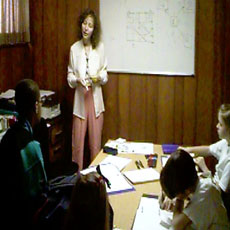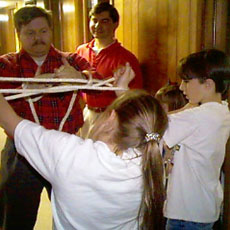| The Math Explorations are being directed by Maria Droujkova, one of Shodor's
newer staff, with other Shodor staff helping out. There are six students
signed up for the morning session, and nine for the afternoon session.
The class began with an exercise and discussion on paradoxes. Maria told the class a story the ancient Greeks used to tell: Suppose there was a visitor from an island who told you that everyone on his island always lied. Could this be true? Amanda started to say that it is true, bit then she and others noticed that if everyone always lied, then this person would be lying, which would mean that everyone did NOT always lie....the students seemed to enjoy both the story and trying to figure out how to tell if it was true. Then Maria suggested another kind of paradox, which is also a "self-referential expression." She wrote on the board, "This sentence hass three mistaakes," and asked the class if the statement was true or false and to give a reason why. Veronica said that it is true, but then she and other students noticed that the situation is not that simple... The students had a lively discussion as they analyzed the sentence to find the errors. They first suggested that there are only two errors in the sentence (spelling mistakes) and, therefore, the sentence was false. But then Robert suggested that this would mean there were only two mistakes, but then that would be the third mistake, so maybe it was true, making it a paradox!

The students spent time trying to come up with other paradoxes and learning how to analyze them by counting the number of apparent falsehoods in a set of statements. Wade constructed paradoxes made of many statements. Maria then began to explain that people started from counting numbers such as: one; two; three and that these are considered natural numbers. She then explained that just this millennia people discovered the number zero. Students used pictures and paper to figure out why the diagonal of a square with unit sides can not be expressed as a fraction of two natural numbers (making it irrational). Christine spent a while trying to express it as a fraction. Tomas approximated it to be "about 1 and 1/3, but not exactly." After discussing several other paradoxes the class had a short break. There are several differences between morning and afternoon sessions. In the morning, conversation during the break turned to topology. Using ropes, students tried to solve a puzzle: can you pick up a straight rope by its ends and tie a knot on the rope without letting go of the ends? Michelle spent a lot of energy trying to do it; Christine had to lie on the floor, and used all her limbs to make the rope form a knot. Robert tied a knot on his arm, but the knot would untie itself when removed from the arm! Maria explained to the students that when you hold a straight rope in both hands, your body and the rope make a circle formation; to create a knot without letting go of the rope you must break the circle formation (before you even pick the rope!). Making the knot in the rope, even when you use tricks, is not a "true paradox"! In the afternoon, students got more interested in "referential paradoxes" and had a lively discussion on how to make a paradox out of series of statements that refer to each other's truthfulness. The students watched as the "truth value" of each statement changed: "true,false,true,... and so on."
Several (now resolved thanks to calculus) paradoxes involving infinity and the infinite series provided a lot of puzzlement and fun. Maria claimed that it is not possible to reach the wall: "You have to reach half the distance first, but before that you must travel the half of that half (of the distance), and even before that you must travel half of that half and so on." As it goes on and on, you can never cover the entire distance. Students made very interesting remarks discussing this paradox. Michelle exclaimed: "You step on infinity halves..." Christine claimed that: "Infinity means forever!" At the end of the meeting, students used spreadsheets to see that for a computer, because of round-off errors, 3/6 minus 1/6 minus 1/6 minus 1/6 does not necessarily equal zero! It was an interesting hands-on example of the case when two different uses of logic lead to contradictory statements. However, it does not mean it is a paradox!
Please direct questions and comments about this page to WebMaster@shodor.org © Copyright 1998 The Shodor Education Foundation, Inc. |



